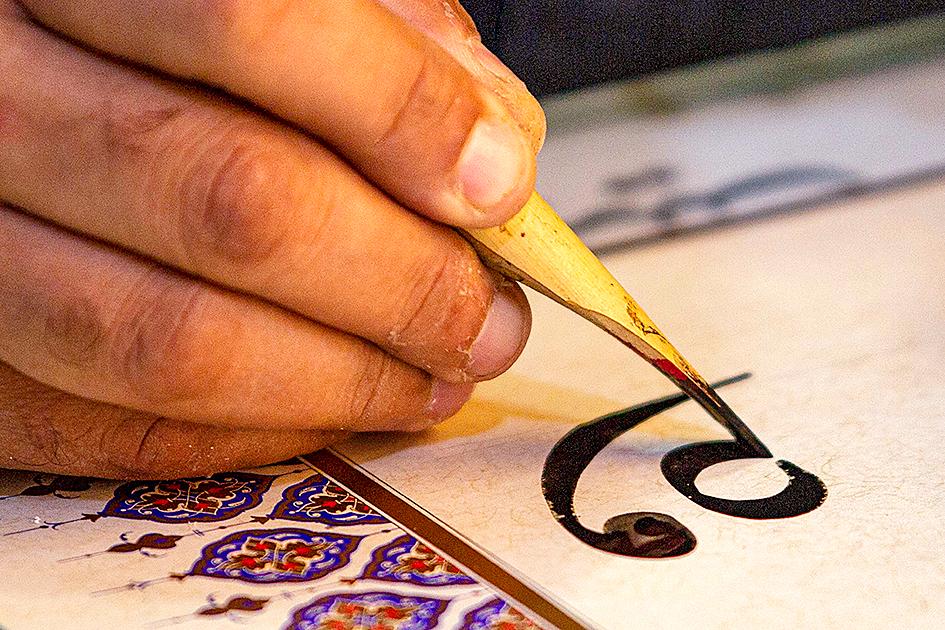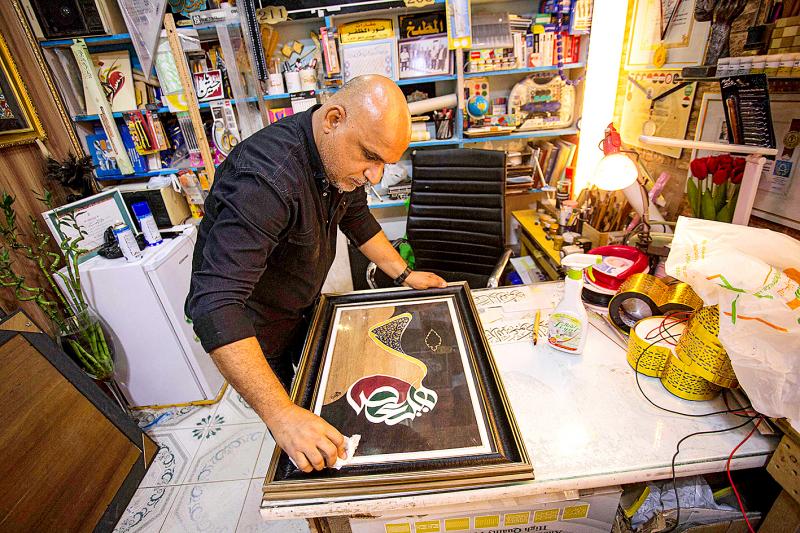Father of 11 children devotes his free time to the maintenance of traditional art recently classified by UNESCO
When not hauling concrete blocks to a construction site in northern Iraq, Jamal Hussein dedicates his time to preserving the gentle art of Arabic calligraphy.
Although he won awards in many competitions, Hussein admitted that “you can’t live with this†– the artistic writing of Arabic writing.
“I have a big family. I have to find another job,” said the father of 11, who is 50 years old and makes a living working on construction sites in the Iraqi Kurdish town of Ranya.
Photo: AFP
Last week, the United Nations cultural agency declared Arabic calligraphy “intangible cultural heritage of humanity,” following a campaign by 16 countries led by Saudi Arabia, including Iraq.
“The fluidity of Arabic writing offers endless possibilities even within a single word, as letters can be stretched and transformed in many ways to create different patterns,†UNESCO said on its website .
Abdelmajid Mahboub of the Saudi Heritage Preservation Society involved in the UNESCO proposal said the number of specialist Arabic calligraphic artists has dropped sharply.

Photo: AFP
Hussein is one of them, and he welcomed UNESCO’s decision. He hopes this will push “the Iraqi government and the Kurdistan Autonomous Region to adopt serious measures” to support calligraphy – khat in Arabic – and its artists.
Practicing since the 1980s, his decades of experience and participation in competitions are evidenced by some forty medals and certificates displayed at his home.
In October, he finished second in an Egyptian online competition and is now training for a competition next month in the Iraqi Shiite holy city of Najaf.
Hussein’s creations are made with a reed pen that he buys in Turkey or Iran. He sometimes sells the work for posters, store displays and even tombstones, he said.
For decades, in the large regional centers of Cairo, Amman, Beirut or Casablanca, calligraphy was displayed on storefronts, on walls bearing popular sayings, or on plaques at the entrance to shops. buildings to signal the presence of a lawyer or doctor.
Today, the remains of this calligraphy are only visible on the faded facades of the old shops. Still, nostalgia for the vintage aesthetic has become a trend, as hipsters across the region post photos of their findings for their followers on social media.
But in an impoverished and war-scarred Iraq, there is no government support “either for calligraphy or for other arts,” Hussein lamented.
“Due to technology, the sanctity of calligraphy has diminished,†he said. “Calligraphy takes more time, more effort and costs more. People are moving towards cheaper technological production.
But it is impossible for Hussein to give up his art. He dreams of “traveling to Egypt or Turkey and living there temporarily to improve my khat”.
At the other end of Iraq, in the southern city of Basra, Wael al-Ramadan opens his shop in an alley.
A client arrives to inquire about the preparation of an administrative stamp used to confirm attendance.
Ramadan grabs one of his sharp pens and resumes practicing the art his father introduced him to when he was still a child.
On paper, he slowly begins to trace the requested words, with Arabic letters distinguished by their elegant curves.
Like his fellow calligrapher Hussein, Ramadan congratulates UNESCO for its “great support for calligraphy and calligraphers around the worldâ€.
Ramadan earns money by teaching discipline in schools, but also sells his skills for advertising purposes.
“We hope that the government will take an interest in this art, through exhibitions and competitions,” said Ramadan, 49, dressed in black with a shaved head.
“The survival of Arabic calligraphy depends on state support.
It also depends on the dedication of men like Hussein and Ramadan.
“I obviously hope my children will succeed me, just as I followed in my father’s footsteps,†Ramadan said with a smile.
Comments will be moderated. Keep comments relevant to the article. Comments containing abusive and obscene language, personal attacks of any kind or promotion will be removed and the user banned. The final decision will be at the discretion of the Taipei Times.

